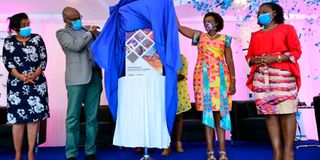Gender expert urges countries to invest in sex-disaggregated data

From left: Nairobi Women Rep Esther Passaris, Kenya Association of Manufacturers (KAM) chair Mucai Kunyiha, Flora Mutahi of Women in Manufacturing (WIM) and KAM CEO Phyllis Wakiaga during the launch of the WIM report last year. The report is to pivot KAM’s advocacy drive of the WIM Program in Kenya, by providing concrete data on the necessary areas to improve. Gender experts now say countries keen on attaining SDGs must increase availability of sex disaggregated data.
What you need to know:
- A global gender and development expert has called on countries to invest in sex-disaggregated data as it is key to holistic achievement of Sustainable Development Goals.
- Across Africa, civil society is beefing up data to aid in accelerating of achievement of the SDGs.
- In Kenya, Groots Kenya has developed a gender data dashboard with visualised information on women’s status in relation to 17 SDGs.
A global gender and development expert has called on countries to invest in sex-disaggregated data as it is key to holistic achievement of Sustainable Development Goals (SDGs).
World Bank global director for gender Ms Caren Grown, said countries keen on attaining SDGs must increase availability of sex disaggregated data.
"In spite of really great process, there are key gender gaps that still exist...54 of SDGs indicators actually ask for sex-disaggregated data but only 10 have widely available data," she said last week in a side event 'Telling the gender data story: highlighting women’s economic empowerment through data collection and visualisation' during the virtual 65th session of the Commission on the Status of Women, ended last Friday.
Across Africa, civil society is beefing up data to aid in accelerating of achievement of the SDGs.
Reservoir of data
In Kenya, for instance, Groots Kenya has developed a gender data dashboard with visualised information on women’s status in relation to 17 SDGs.
The dashboard created in 2018, is a reservoir of data collected by women themselves and collated by Groots Kenya team.
It currently constitutes data on status of women in five counties; Kitui, Kakamega, Laikipia, Kiambu and Nakuru.
In coming up with the dashboard, Groots Kenya sensitised the women on the SDGs and the indicators to be measured in each target under SGDs Mashinani initiative.
In Tanzania, a group of youth professionals under a non-governmental organisation, Young and Alive Initiative, are using girls’ generated data to tackle female genital mutilation (FGM).
Government’s data on gender-based violence (GBV) showed high prevalence rates in Mbeya district, southwest Tanzania.
Forms of violence
The 2011 statistics showed that 55 per cent of women aged between 15 and 49 years had experienced various forms of violence. But they were just statistics lacking recommendations on solutions.
So in 2019, the young professionals sought to fill the gap.
“Our focus was on FGM. We presented the statistics to the girls and women and asked them “what can we do?” said Ms Ninabina Dave, Policy and Advocacy Advisor in the organisation in an interview with nation.africa, last year.
Gender responsive budgeting and adequate funding are among key issues that gender equality advocates across the world are pushing for through the Generation Equality campaign.
United Nations Secretary General António Guterres is already on the radar of the advocates who want him to firm up funding for gender equality initiatives including ensuring UN Women is adequately resourced.





